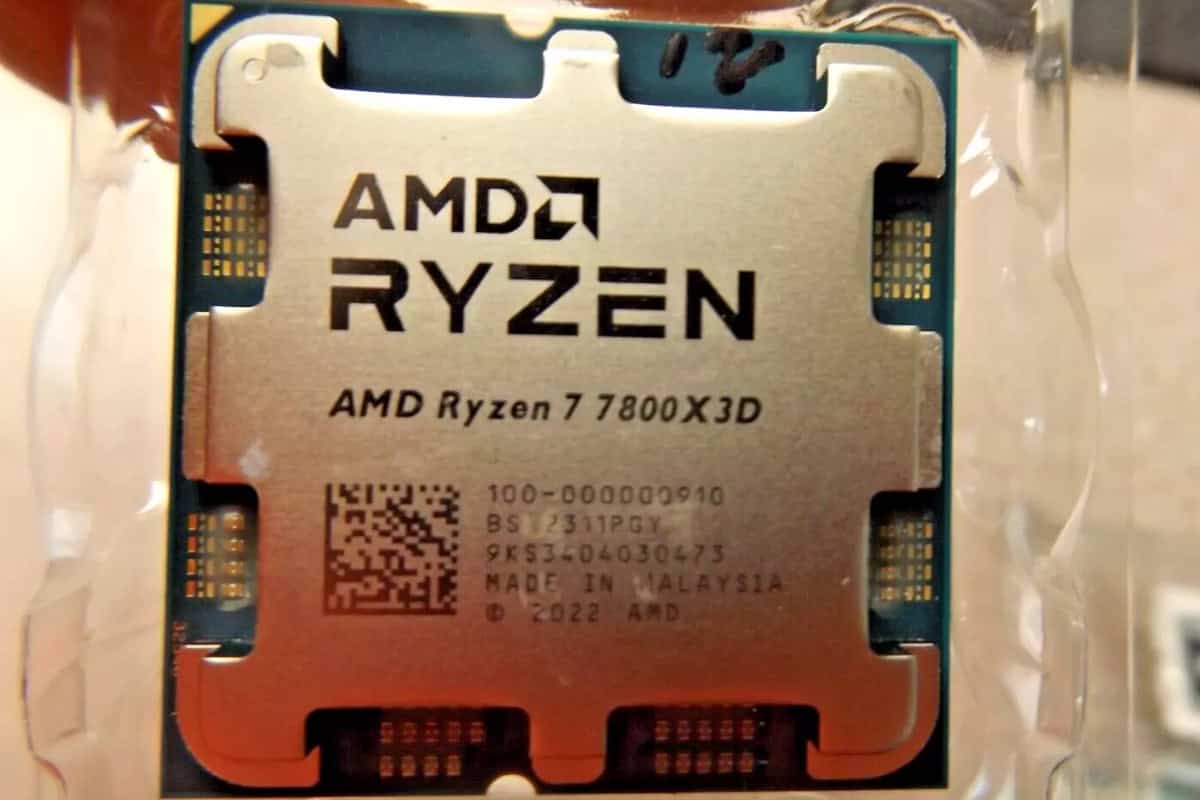In the world of building PCs, finding a great deal on a sought-after component like the AMD Ryzen 7 7800X3D can be really exciting. But there’s a potential problem – some fake versions of this component are being sold. These fake products not only waste your money but can also cause your computer to have problems and not work right. To avoid falling for these tricks, we need to be knowledgeable and careful when buying PC components. Scammers are making fake versions of the popular AMD Ryzen 7 7800X3D CPU that look very similar to the real thing but don’t work properly.
These fake AMD Ryzen 7 7800X3D CPUs are a big challenge for buyers today. We need to be smart and well-informed about the hardware we want to buy. With the AMD Ryzen 7 7800X3D CPU becoming more and more popular, it’s important to take every step we can to make sure we’re getting the real deal. Whether it means checking the packaging, confirming serial numbers, or only buying from trusted sellers, being cautious will help protect against the danger of fake processors. Always be careful: if a deal seems too good to be true, it probably is.
The Dark Side of Tech Deals: Counterfeit CPUs in the Wild
Recent reports have uncovered a concerning trend in the tech world: the rise of counterfeit AMD Ryzen 7 7800X3D processors. These fake chips, while looking deceptively similar to the real deal, are far from it in terms of performance and functionality. Buyers, especially those seeking deals on second-hand marketplaces, need to be extra vigilant.
Telltale Signs of a Fake
- Mismatched Markings: The engravings on the heat spreader might be inconsistent with a genuine 7800X3D. Check for typos, misaligned text, or differences in font.
- Suspicious Packaging: If the packaging looks cheap, lacks proper labeling, or has inconsistencies with official AMD packaging, it’s a red flag.
- Unrealistic Pricing: If the price seems too good to be true, it probably is. The 7800X3D is a high-demand CPU, so significantly low prices should raise suspicion.
- Performance Issues: Once installed, a counterfeit chip will likely exhibit poor performance, frequent crashes, or fail to boot altogether.
Comparing Real vs. Fake
| Feature | Genuine 7800X3D | Counterfeit 7800X3D |
|---|---|---|
| Heat Spreader Markings | Clear, consistent, and accurate | Potentially blurry, misaligned, or inaccurate |
| Packaging | High-quality, official AMD branding | Cheap, generic, or inconsistent with AMD branding |
| Price | Generally consistent with market value | Significantly lower than market value |
| Performance | High-end gaming and productivity performance | Poor performance, instability, or failure to function |
Protecting Yourself
- Buy from Reputable Sellers: Stick to authorized retailers or well-known online marketplaces with buyer protection policies.
- Inspect Carefully: Before purchasing, scrutinize the product photos and ask the seller questions about its origin and condition.
- Test Thoroughly: If you suspect a chip might be fake, run benchmark tests and compare the results to those of a genuine 7800X3D.
- Report Suspicious Activity: If you encounter a counterfeit chip, report it to the marketplace or platform where you found it.
The allure of a bargain can sometimes lead to costly mistakes. When it comes to high-value components like CPUs, it’s crucial to prioritize authenticity and purchase from trusted sources. Remember, the performance and reliability of your system depend on it
Short Summary:
- Fake AMD Ryzen 7 7800X3D processors are flooding the market.
- Scammers use advanced techniques to mimic real packaging and product details.
- Tech experts are advising consumers to buy only from verified sources.
The AMD Ryzen 7 7800X3D has quickly become a sought-after gaming CPU, celebrated for its performance and efficiency in gaming and productivity tasks. However, the burgeoning demand has unfortunately created an environment ripe for fraudulent activities, with counterfeit versions of the CPU appearing on the market. A recent incident reported by tech YouTuber Der8auer revealed how easily deceptive these fake processors can be, leading to confusion among unsuspecting buyers.
This technological conundrum was brought to light when a consumer in Romania purchased what he believed to be a legitimate Ryzen 7 7800X3D from a third-party seller on OLX, a popular online marketplace for buying and selling in Europe. The buyer, who paid approximately €300—about €100 less than retail—was excited about the supposed deal. Unfortunately, upon attempting to power up his system with the CPU, it failed to boot. The customer, realizing something was amiss, used a multimeter to check for electrical connections on the printed circuit board (PCB) but found none.
“The CPU was dead. Nothing happens. I tried basic checks and saw no signs of life,” the unfortunate buyer said.
To delve deeper into this troubling case, Der8auer purchased the faulty chip and performed a detailed analysis. His investigation revealed some striking differences between the counterfeit model and the genuine Ryzen 7 7800X3D. At first glance, both CPUs appeared similar, but close examinations unveiled several discrepancies. The first clue was the washed-out labels on the fake chip, along with a shallower, thinner PCB measuring just 0.964 mm compared to the 1.308 mm of the authentic processor. This discrepancy in thickness cansubject the chip to inadequate pressure when seated in a socket, hindering its performance.
Notable Differences Between Fake and Real Ryzen 7 7800X3D
- PCB Thickness: Fake CPUs have a thinner PCB.
- IHS Characteristics: The integrated heat spreader (IHS) designs differ significantly.
- Capacitor Quality: Counterfeit models lack the protective resin commonly found on real units.
Adding to the identification hurdles, the counterfeit CPUs had serial numbers matched to the box, making it nearly impossible for a casual buyer to discern authenticity. However, it was soon revealed that the capacitors surrounding the IHS on the fake chip were not adhered with the expected protective glue, a feature standard on genuine Ryzen processors. The fake chip appeared too pristine and uniform in its PCB’s appearance, which triggered further suspicion from Der8auer.
“The deliberate design aimed to mimic the real chip is both fascinating and frightening,” said Der8auer. “This shows a high level of effort in counterfeiting that could easily fool inexperienced buyers.”
In an attempt to distinguish the fraud further, Der8auer decided to delid the processor. This procedure revealed the absence of any functional silicon components beneath the IHS. Instead, he found that the PCB merely hosted a small mound resembling a chip to deceive the buyer into thinking the CPU contained legitimate hardware. This scam has highlighted the lengths to which counterfeiters will go in order to exploit technology enthusiasts.
The implications of this revelation are vast, especially for gamers looking to acquire high-performance CPUs without overspending. Given the popularity of the AMD Ryzen 7 7800X3D, scammers are betting on individuals desperately seeking deals being unaware of the red flags associated with fake products. Therefore, it has become essential for buyers to approach online marketplaces with skepticism and diligence.
How to Avoid Purchasing a Fake Ryzen 7 7800X3D
- Always buy from verified retail outlets.
- Check for warranty and return policies to safeguard your purchase.
- Be cautious of prices that seem too good to be true.
- When buying second-hand, perform extensive checks and ask for proof of purchase.
Consumer awareness is key to combating these scams, and tech experts urge potential buyers to familiarize themselves with how genuine Ryzen products should appear before making a purchase. For instance, the IHS on the real Ryzen 7 7800X3D should feel solid and well-attached, and the capacitors should be secured with adhesive resin. The top layer must also present the distinctive color associated with authentic AMD chips, typically a more muted green rather than a bright blue.
Additionally, it’s advised that buyers take advantage of community resources and forums where they can consult with seasoned users and share their experiences. Engaging in discussions on platforms dedicated to gaming and tech allows consumers to remain informed on potential scams and receive real-time warnings about fraudulent sellers. Websites such as Reddit or specialized tech communities often feature enlightening threads highlighting recent scams and tips to avoid them.
“In this age of digital transactions, awareness and research are your best defenses against scams,” cautioned Der8auer. “You may save money now, but the consequences of a counterfeit product can be damaging in the long run.”







